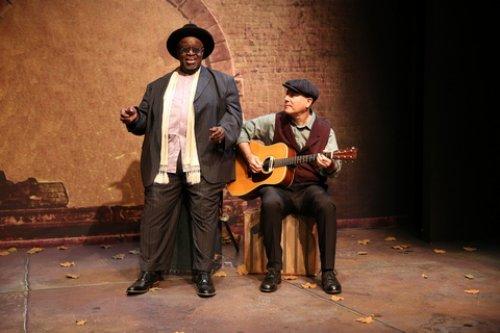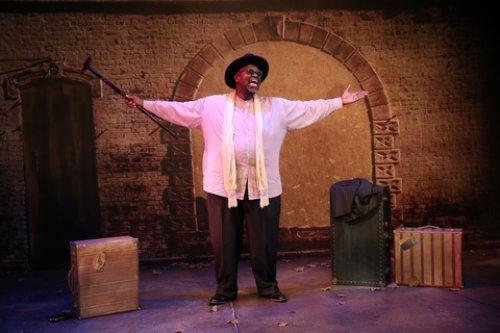Lonesome Blues
A biographical solo musical about the blues singer Blind Lemon Jefferson. Akin Babatundé’s performance is awesome but the storytelling is muddled.

Akin Babatundé as Blind Lemon Jefferson and David Weiss on guitar in a scene from “Lonesome Blues” (Photo credit: Carol Rosegg)
[avatar user=”Darryl Reilly” size=”96″ align=”left” ] Darryl Reilly, Critic[/avatar]The biographical solo musical Lonesome Blues features Akin Babatundé’s awesome performance as the African-American performer and song-writer Blind Lemon Jefferson, the superb guitarist David Weiss but unfortunately muddled storytelling.
With his richly melodious voice that ranges from deep to high and to smooth and his charismatic presence, Mr. Babatundé is commanding. Off to the side is Mr. Weiss playing guitar and their teamwork overcomes the imperfect conception.
The physically imposing Babatundé appears wearing dark glasses, a black hat and a black suit. It is 1929 and he is at Chicago’s train station. For 30 minutes, Babatundé putters around in semi-darkness, rambles on and sings one blues song after another. There’s a lack of background information imparted and so despite the great renditions it becomes stultifying. One wonders who is this and why am I watching this?
The show then become energized when Babatundé describes how Jefferson was discovered by a music executive when he was singing on the Texas streets while holding a tin cup. A recording contract follows and Jefferson became a leading blues performer in the 1920’s. Another bright sequence is a recreation of a concert. In the second half, we learn more about Johnson and the narration is more connected to the musical portions as it successfully concludes.

Akin Babatundé in a scene from “Lonesome Blues” (Photo credit: Carol Rosegg)
Alan Govenar co-wrote Lonesome Blues with Babatundé. Their affection for and research of Jefferson is evident but their structure is as noted not very compelling. The score consists of a mostly unfamiliar assortment of over 30 songs including ones by Jefferson, traditional numbers and new compositions by Mr. Govenar and Babatundé.
Director Katherine Owens brings presentational polish to the production with her assured staging that injects as much momentum as possible given the problematic material.
James Morgan’s scenic design of an aged brick wall perfectly represents the train station. That’s accompanied by vintage trunks, suitcases and chairs that in unison creates an arresting period and otherworldly landscape. Steve Woods’ moody lighting design relies on evocative dimness with bursts of luminosity. Sound designer Jason Johnson-Spinos expertly modulates the musical sequences and effects such as rumbling trains and eerie vocal extracts. Gelacio Eric Gibson’s costume design authentically conjures the appearance of the 1920’s.
Lonesome Blues began in 1998 at a Dallas, Texas workshop as Blind Lemon: Prince of Country Blues. It was a multi-character work that August Wilson praised and said he had attempted to write a play about Jefferson but was hampered by the spare facts known about him. Instead he went on to write Ma Rainey’s Black Bottom.

Akin Babatundé in a scene from “Lonesome Blues” (Photo credit: Carol Rosegg)
Renamed Blind Lemon Blues the show was staged in Dallas in 2001. It was reconceived from 13 to six actors and performed in Europe. In 2007, it played at the Guggenheim Museum and then at the York Theatre, followed by a European tour. In 2009, the York Theatre presented another production of it.
Now, Govenar and Babatundé put forth this simplified incarnation that is disappointing considering the amount of time and effort expended. Their shaky plotting results in a fitfully entertaining experience.
Lemon Henry Jefferson was reportedly born blind in 1893 to a share-cropper family in rural Texas. The facts of his early life are obscure and many personal details are unknown. He began playing guitar and singing in his early teens. He befriended the musician Lead Belly in Dallas. Signed to Paramount Records he became a major figure in the 1920’s, recording in Chicago. His premature death at the age of 36 in 1929 was most likely due to a heart attack but inspired fantastical theories such as a jealous lover poisoning him.
Lonesome Blues (through July 1, 2018)
The York Theatre Company at Saint Peter’s
619 Lexington Avenue, at 54th Street, in Manhattan
For tickets, call 866-811-4111 or visit http://www.yorktheatre.org
Running time: 85 minutes with no intermission






Leave a comment